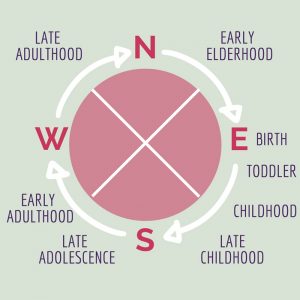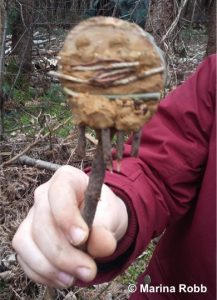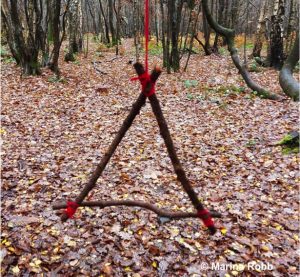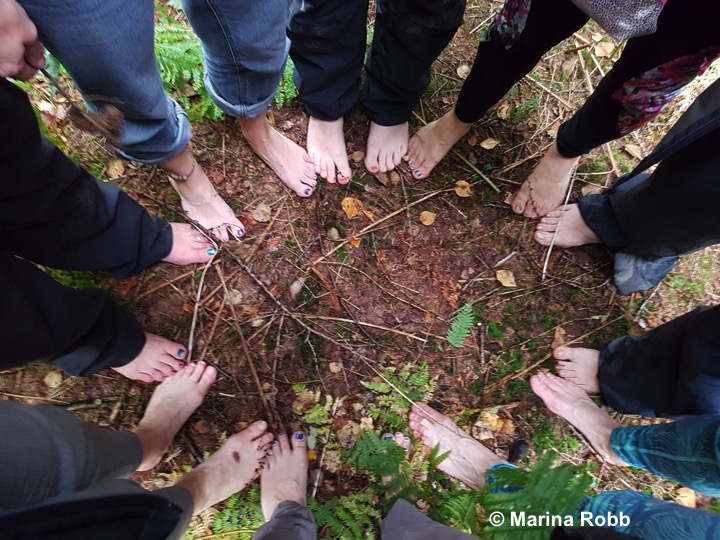A strand of work for Early Childhood Outdoors that is currently making great progress is that of supporting and promoting the range of training opportunities providing the kind of personal and setting development practitioners are looking for. There is a need for training that helps us give children more time and wider experiences outdoors, and there is need for courses that create time to think more deeply about what it means to be in the outdoors and how we can best work in partnership with the outdoors. ECO can also join the dots of the various training possibilities and hence help to provide linked pathways through each of these.
A pathway that we are keen to see open up and become more widely followed is one for exploring the therapeutic nature of the outdoors and developing the ability to work with this important aspect of being outdoors, especially through environments rich in nature. So it’s exciting to hear in this post from Marina Robb, co-author of the lovely book Learning with Nature, about her plans for the pioneering Nature Gateway Project bringing education and health together through experience in the outdoors, and an invitation to get involved!
Wellbeing: the self, other, our mental health and nature by Marina Robb
Growing up is never easy! Often what we long for as adults, is really an indicator of what we need most in our lives. As practitioners who work with children and young people, we are more effective when we have the ability to know our unmet needs which provides a greater capacity to generate love and care for ourselves. It is from this place that we can care for another child or person.
When we are young, most of us didn’t get what we needed all the time (the human condition) and even more important, we didn’t know how to get it: how to reach out for help, and continue to do this, when the ‘other’ (the adult) rejects us in some form or another. We naturally learn to compensate, and it is by reclaiming our vulnerability – a very misunderstood term, that we can find our way to wellbeing and to support the wellbeing of others.
At the heart of being human, is the essential need of human relationship – the other. Our psychological development through the stages of life – from birth to elderhood, grows this sense of self. Our lives grow in the wider context of the natural world too. We are nature, and ‘our nature’ is fundamental to health and learning.
Much of my nature-based practice is underpinned by what I call, Nature-centric Wheels. The Nature-centric Wheel below shows the stages of life from 0 – 80, linking these to both times of the day and a compass direction. At its simplest level – the East (Spring) direction is sunrise, the beginning of the day and life (the baby), the North direction is elderhood, the night-time or winter of our lives!

The prevalence of ACE’s (Adverse Childhood Experiences) echoes the widespread reality of childhood trauma-related experience. Years of nature-based practice has also shown me how the natural world, as ‘other’, silently reflects back to us, offering metaphors and sensory experience that support our growth and development. In many ways for many of us lucky enough to have played and enjoyed nature as a child or adult, the role of nature as an unconditional friend represents an unscarred relationship.
‘In nature, nothing is perfect, and everything is perfect. Trees can be contorted, bent in weird ways, and they’re still beautiful.’ (Alice Walker)
There is a link between our ability to understand our own behaviours, those of others, our knowledge and ease with different mental states (feelings, thoughts, beliefs) and the ability to respond to an infant’s emotions and feelings.

How do we as practitioners develop our ability to respond authentically to children, to maintain a healthy distance from our reactions so as to be genuinely available to listen, non-verbally as well, to the ‘other’ person in our care? To consider how we empower, despite our positional power? Meeting our needs, awareness of power dynamics, our triggers, what supports our and others self-regulation is part of creating a safe and resilient environment for our children.
Fortunately practice in nature supports self-regulation – particularly all the bottom up (body-based) strategies. Our autonomic nervous system is soothed, our threat system is reduced, and we are all more able to have fulfilling relationships with each other – all increasing our ‘attainment’ potential.
Health and learning are deeply intertwined. When we enjoy learning, have healthy bodies and lifestyles – which include playing and learning in the outdoors – we become socially confident and connected people, who feel valued for their contributions: power is shared. The intrinsic motivation, autonomy and sovereignty we encourage through child-centred/self-directed approaches, also help us to trust others and learn to meet our needs. Many of us know how it felt to be in school and not enjoy the experience. When people are asked what most stopped them in a subject from continuing, they often point to a time when they were shamed by an adult.
According to Brene Brown (2017), your real sense of worthiness relates to the core 4 sense qualities below. Take a moment to consider your own sense of self and if you feel you are worthy of love and belonging? Can you:
- Tell the story of who you are, with the courage to be imperfect (sense of courage)?
- Are you kind to yourself first, before others (sense of compassion)?
- Are you authentic, willing to let go of who you think you should be, to be who you are (sense of connection)?
- Are you willing to say things, like I love you, or help, to be imperfect, to be seen (sense of vulnerability)?

We learn through the actions of others, often that we are not fundamentally okay. We are punished (or rewarded) for our expressions and we learn that our range of feelings and behaviours are not acceptable. We hide who we are. Children from the poorest 20% of households are four times as likely to have serious mental health difficulties by the age of 11 as though from the wealthiest 20% (Morrison Gutman et al 2015). Children and young people with a learning disability are three times more likely than average to have a mental health problem (Lavis et al 2019) (see Mental Health inequalities in Numbers, Centre for Mental Health 2020). In my experience of working with teenagers for over 15 years, referred from the Child and Adolescent Mental Health service (CAMHS) to our long-term nature programme, I almost always discover young people who are incredibly emotionally aware, but have not found a way yet to belong.

How can we best support children and young people now and into the future? At Circle of Life Rediscovery CIC, we are pioneering ‘The Nature Gateway Project’ – a four day training (supported with webinars and a manual) that equips practitioners from all backgrounds to take their practice into the outdoors. We are currently looking for key practitioners and stakeholders who would like to take part free of charge in funded, ‘Proof of Concept Training’ – for education and health practitioners, starting in Spring/Summer 2021. This is an invitation to radically reimagine our relationship between nature, education and human mental health whilst offering a practical course in how to do this that is accessible, relevant and of its time!
If you are interested in finding out more, please contact, Marina Robb, Director of Circle of Life Rediscovery CIC and The Outdoor Teacher Ltd (coming soon) at info@circleofliferediscovery.com
Marina Robb (PGCE, MSc, MA) is Founder and Managing Director of Circle of Life Rediscovery CIC and The Outdoor Teacher Ltd, organisations that aim to transform education and health through nature. She is a leading author, green practitioner and educator in the outdoor sector, an international trainer in the design and delivery of nature-based experiences and an advocate for the integration of environmental, education and health and wellbeing services. Marina is co-author of ‘Learning with Nature’ (Green Books 2015) and an upcoming new book written with Jon Cree: ‘The Essential Guide to Forest School and Nature Pedagogy’ published by Routledge (Winter 2020/21).
References
Brown, B (2017) Braving the Wilderness – the quest for true belonging and the courage to stand alone. (Penguin)
Morrison Gutman, L. et al (2015) Children of the new century. London: Centre for Mental Health and University College London
Lavis, P. et al (2019) Overshadowed. London: Children and Young People’s Mental Health Coalition

